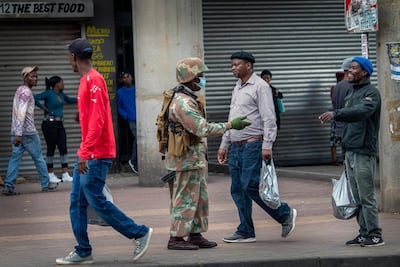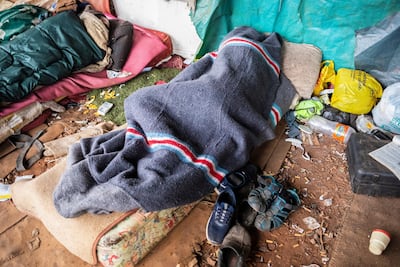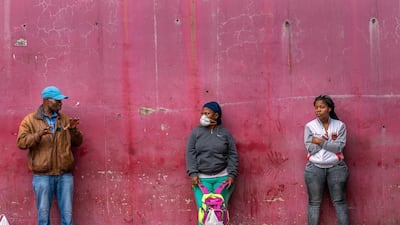As many countries continue to struggle to contain the ongoing spread of the novel coronavirus and keep their populations healthy, some nations are seizing upon the crisis to transform how government and the economy operate. Across the world’s democracies, panicked citizens are giving up civil liberties such as privacy in an effort to track the virus’s spread. In others, the crisis contains an ironic silver lining. Simply put, some nations are in desperate need of a profound transformation. South Africa is one such place.

This is not to deny the gravity of this health crisis. There is no denying the possibility that Covid-19 could bring wholesale destruction to South Africa and many other countries on the African continent. A struggling economy compounded by a decade of mismanagement and sky-high unemployment is the last place that could benefit from a once-in-a-century health emergency. Throw into the mix a large population of immunocompromised citizens due to HIV, and the situation is downright dire.
According to the OECD, governments across Africa spend roughly $12 per capita per year on health care, compared with more than $4,000 in the United Kingdom. Some countries have less than 100 ventilators on hand with little recourse to purchase additional supplies.

Leading the continent’s response to the crisis, South Africa’s President Cyril Ramaphosa announced a strict nationwide lockdown more than 10 days ago. Beginning on March 26 and lasting to April 16, the lockdown is far more serious than similar examples in the West. The government has imposed restrictions on everything from walking your dog to purchasing cigarettes.
This is no small feat in a country like South Africa, which has a sordid history of lockdowns and curfews from the Apartheid era. In densely populated poor slums, moreover, people do not have the ability to stockpile food and social isolation is impossible in such cramped living quarters.
The lockdown announcement was hailed by a broad section of South African society and virtually all political parties. Glowing articles in the Western press have praised Mr Ramaphosa’s leadership, despite the toll it will take on the country’s already fragile economy.
Last week, Moody’s became the final major credit agency to downgrade the country’s investment grade to junk status. This is a dreaded development for any economy, and triggered an outflow of passive investment income. The South African rand, which has been one of the worst-performing emerging market currencies, has now lost close to 40 per cent of its value to the dollar since January.

But here is the silver lining. This type of dramatic and deep shock to the economy was perhaps the only thing that could bring about systemic change. Mr Ramaphosa was elected on a platform of reforming the economy and reversing the damage his predecessor Jacob Zuma wrought through mismanagement, corruption, and cronyism. But his efforts have been stifled by political infighting, internal corruption in his party, and the outsized power of several unions. Few critical measures have been taken to triage the economy since he came to power more than two years ago.
Consider the fledging state-owned airline South African Airways. Mired in debt, the state has essentially been forced to keep pumping money into the carrier. The Covid-19 crisis is wreaking havoc on the global aviation industry and might just be the nail in SAA’s coffin. Most economists agree that the airline's collapse is a necessary step in any economic recovery.
The national power utility, Eskom, is another state-owned enterprise that is benefiting from the Covid-19 crisis. Due to its ageing infrastructure, Eskom has been forced to implement rolling blackouts through the country, which has humbled the manufacturing sector. With heavy industries shuttered for three weeks, Eskom has been able to conduct several repairs to the power grid that will at least buy more time while a political decision is made about future investment in energy.
Mr Ramaphosa himself is likely the greatest winner in this crisis, depending upon how the next several months unfold. His position has been strengthened as opposition parties have been forced to simply fall in line behind the commander-in-chief. While there have been widespread reports of excessive police brutality in administering the lockdown, political goodwill remains strong across various sectors of society.
Thus far, the lockdown has been able to flatten the curve of infected people and the government is creatively re-tooling testing kits for TB to be used on possible coronavirus patients. But anything can change and given the vicious spread of the disease, no official is ready to say that South Africa has reached the peak. Covid-19 is undoubtedly the most severe crisis democratic South Africa has faced in its short history. But this freak event might be the catalyst the country needs to overcome its man-made crisis. As we consider the post-Covid-19 geopolitical landscape, the changes taking place in South Africa facilitate a critical preview of the destruction and possible resurrection this crisis is creating.
Joseph Dana is the editor of emerge85, a project exploring change in the emerging world and its global impact

